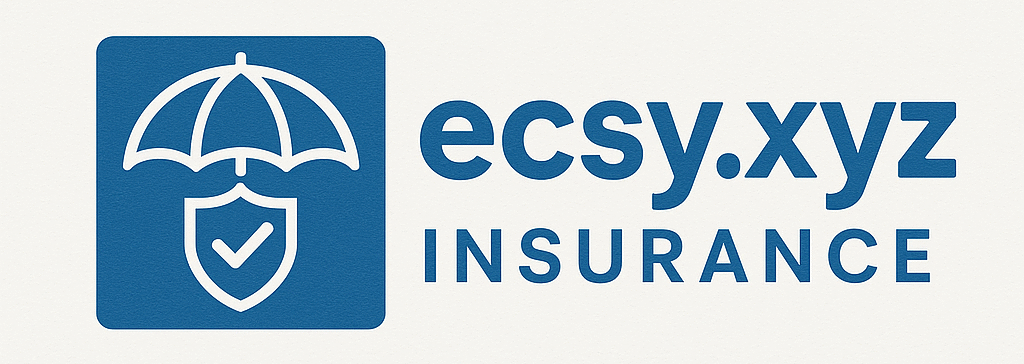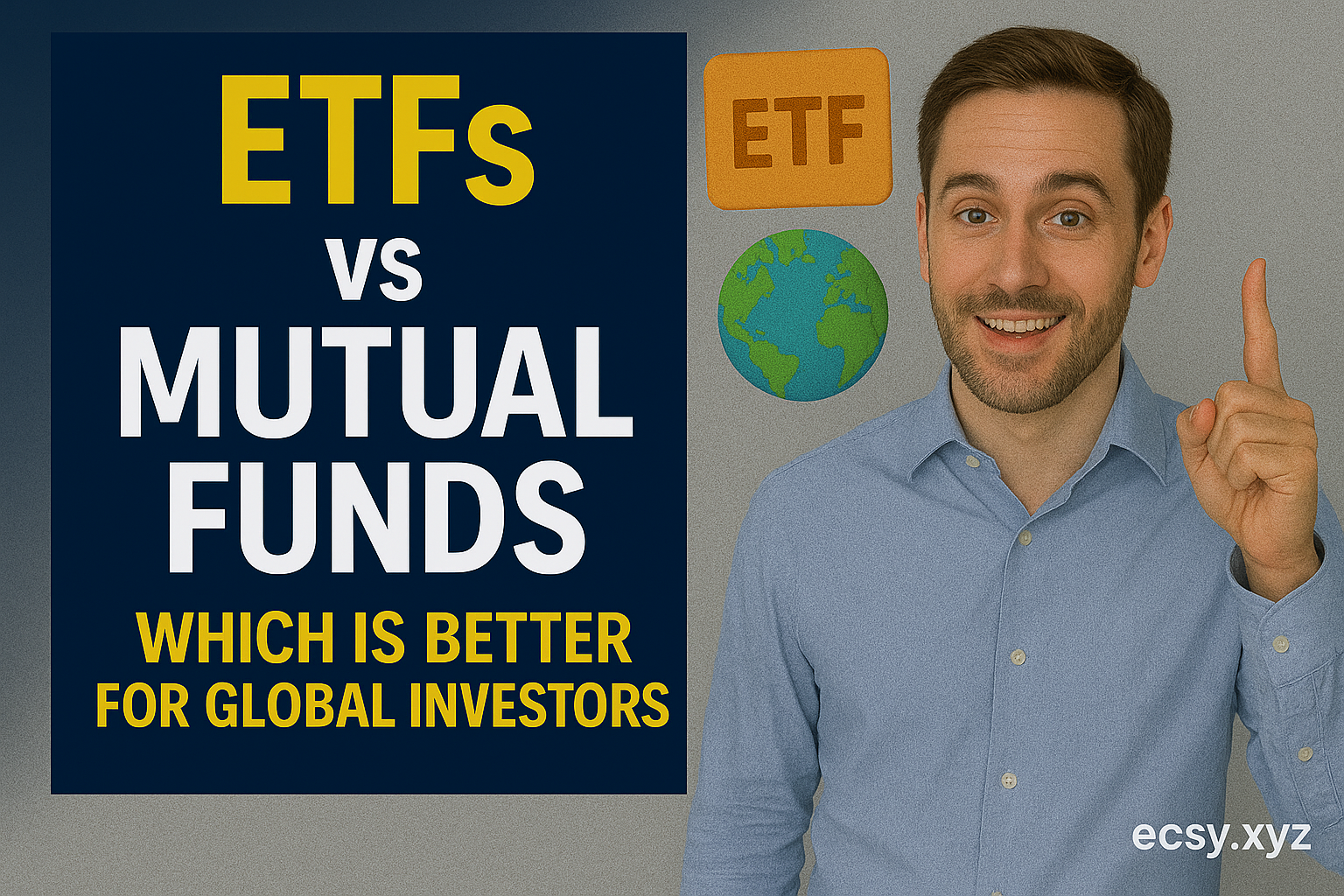ETFs vs Mutual Funds – When it comes to investing globally, there’s one question that pops up repeatedly: Should I choose ETFs or Mutual Funds? It’s not just about picking between apples and oranges—it’s more like choosing between a Tesla and a Toyota. Both get you to your destination, but how they do it and what they cost you on the way is quite different.
So, let’s break down these two popular investment vehicles and help you decide which one suits you best if you’re aiming for global exposure.

Understanding the Basics
What Is an ETF (Exchange-Traded Fund)?
An ETF is like a basket of investments—stocks, bonds, commodities—that you can buy or sell on a stock exchange just like an individual stock. It’s passive, low-cost, and super flexible. You can invest in a global ETF that mirrors markets in the U.S., Europe, or Asia.
What Is a Mutual Fund?
A mutual fund pools money from many investors to buy a diversified portfolio, managed by professionals. Some are actively managed (trying to beat the market), while others mimic indexes (like index mutual funds).
How Are They Structured Differently?
ETFs trade like stocks throughout the day. Mutual funds? They only trade once a day after the market closes. That’s a big deal if you’re timing entries and exits.
Key Differences Between ETFs and Mutual Funds
Management Style (Active vs Passive)
Mutual funds are often actively managed, meaning a team of experts makes decisions to outperform the market. ETFs usually track an index, which keeps costs low. Although actively managed ETFs are becoming more common, they’re still the minority.
Trading Mechanism
You can trade ETFs anytime the market’s open—like flipping a stock. Mutual funds are more old-school—you buy or sell them at the day’s closing price.
Expense Ratios and Fees
ETFs typically have lower fees. The average ETF expense ratio is around 0.20%, while mutual funds can go as high as 1% or more. Over time, that’s a big dent in your returns.
Tax Efficiency
Thanks to something called the “in-kind redemption” process, ETFs are generally more tax-efficient. Mutual funds, on the other hand, distribute capital gains even if you didn’t sell your shares.
Transparency and Holdings Disclosure
ETFs reveal their holdings daily. Mutual funds? Usually just quarterly. So if you like knowing exactly what you own, ETFs take the lead here.
Pros and Cons for Global Investors
Advantages of ETFs
-
Lower costs
-
Greater transparency
-
Real-time trading
-
Tax advantages
Advantages of Mutual Funds
-
Easier to automate investments
-
Professionally managed portfolios
-
Ideal for dollar-cost averaging
Drawbacks of ETFs
-
Brokerage commissions (although this is decreasing)
-
Price fluctuation throughout the day can cause anxiety
-
Not ideal for small, frequent investments
Drawbacks of Mutual Funds
-
Higher fees
-
Tax inefficiency
-
Less flexibility in trading
Performance and Historical Returns
How ETFs Perform Globally
Global ETFs offer solid long-term returns, especially those tracking emerging markets or developed international indexes. Performance closely follows the benchmark index.
Historical Returns of Mutual Funds
Actively managed global mutual funds may outperform in certain years, but their consistency is questionable, especially after accounting for higher fees.
Accessibility and Liquidity
Global Market Access Through ETFs
ETFs can be a one-click way to access global sectors. Want exposure to Japanese tech or Brazilian energy? There’s likely an ETF for that.
Redeeming Mutual Fund Shares Internationally
Selling mutual funds abroad can sometimes be a headache due to paperwork, time delays, and market regulations in different countries.
Tax Implications Across Countries
Withholding Taxes on Dividends
Many countries withhold taxes on dividends. ETFs may help optimize this if they’re domiciled in tax-favorable jurisdictions like Ireland.
Capital Gains Distribution
Mutual funds often distribute capital gains, which means tax—even if you didn’t cash out. ETFs generally avoid this thanks to their structure.
Which Is Better for Long-Term Investing?
Dollar-Cost Averaging with Mutual Funds
Mutual funds are tailor-made for consistent monthly investments. You don’t have to time the market—just set and forget.
Rebalancing with ETFs
ETFs are better for DIY investors who like adjusting their portfolio manually. It’s easy to buy/sell and rebalance using ETFs.
Risk Factors and Volatility
Tracking Error
ETFs might not exactly match the index due to tiny tracking errors, but they’re usually minimal.
Market Risks
Both mutual funds and ETFs are subject to global market swings. Investing across geographies doesn’t eliminate risk—it spreads it.
Currency Exposure and Diversification
Currency Hedged ETFs
These protect you from currency volatility—a lifesaver if the dollar or euro suddenly tanks.
Mutual Funds Offering Global Exposure
Many actively managed mutual funds include hedging strategies, but you’ll often pay more for that privilege.
Regulatory Considerations
U.S. Domiciled Funds vs International Funds
U.S. investors often prefer U.S.-based ETFs for tax reasons. International investors should be mindful of local tax treaties and fund domiciles.
Investor Protections and Fund Governance
Mutual funds are often heavily regulated with strict disclosures. ETFs follow exchange rules but vary depending on domicile.
Cost Comparison for Global Investors
Front-End Loads and Redemption Fees
Mutual funds sometimes charge loads (entry/exit fees), which can eat into your initial investment. ETFs usually avoid these.
Brokerage Commissions for ETFs
Many brokers now offer commission-free ETFs, but fees may still apply, especially for global investors trading on foreign exchanges.
Use Cases – Which One Fits Your Goals?
Beginners and Passive Investors
Mutual funds offer a hands-off approach. Just set up an SIP and relax.
Active Traders and Tax-Conscious Investors
ETFs are perfect for those who want control, lower taxes, and fast trading.
Expert Opinions and Market Trends
Global Adoption of ETFs
ETF assets are soaring worldwide, especially in Europe and Asia. Investors love the simplicity, cost, and transparency.
Future of Mutual Funds
Mutual funds aren’t dead—they’re evolving. Expect more passive, low-cost options and hybrid strategies in the future.
Conclusion
So, ETFs or mutual funds? It really depends on your goals, experience, and where you live. If you’re a global investor who loves flexibility, low fees, and tax efficiency, ETFs are probably your best friend. But if you prefer professional guidance, automatic investments, and a hands-off strategy, mutual funds might be your match.
Whatever you choose, make sure it aligns with your financial goals and risk appetite. Happy investing!
FAQs
1. Can I invest in both ETFs and Mutual Funds?
Absolutely! Many investors use a mix to diversify and balance their portfolios.
2. Are ETFs safer than Mutual Funds?
Safety depends more on what the fund holds, not the structure. Neither is inherently safer.
3. What’s better for retirement investing?
Mutual funds are often preferred for automatic contributions, while ETFs shine in tax-advantaged retirement accounts.
4. Do Mutual Funds pay dividends like ETFs?
Yes, but ETFs often pay them more regularly and transparently.
5. How do I buy ETFs as an international investor?
You can buy them through international brokerage accounts that provide access to U.S., European, or global exchanges.

